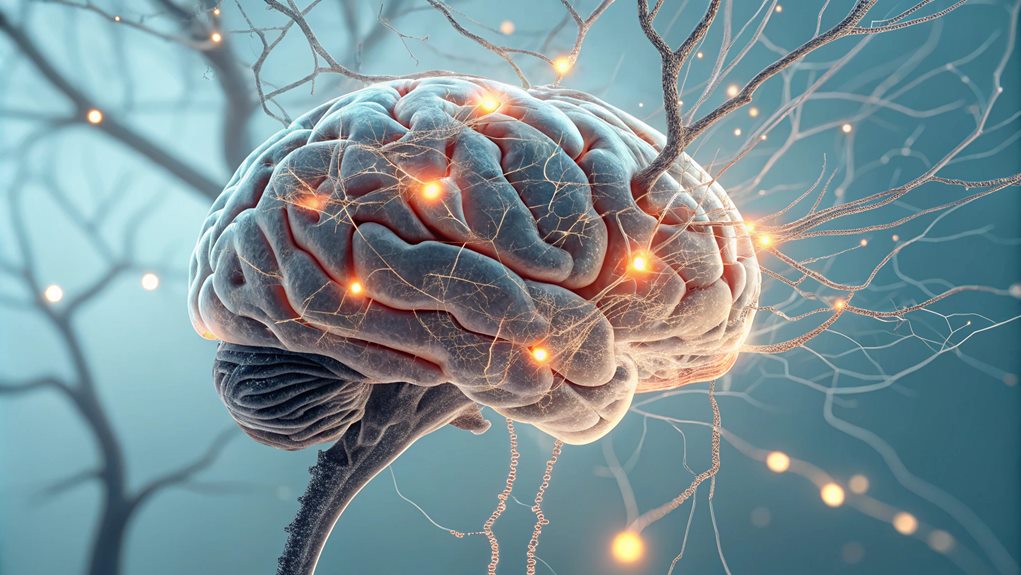Can Memory Loss From Diabetes Be Reversed?

Memory loss from diabetes can be partially reversed through targeted interventions.
You’ll need to focus on strict glycemic control, as elevated blood sugar damages brain vessels and disrupts neural processes.
Key strategies include medications like metformin for neuroprotection, regular physical activity to boost BDNF production, and a Mediterranean-style diet rich in essential fatty acids.
You should also incorporate cognitive stimulation exercises, stress management techniques, and proper sleep hygiene into your daily routine.
When combined with professional medical oversight and consistent blood sugar monitoring, these approaches can help restore cognitive function.
Further exploration of these strategies will enhance your understanding of available treatment options.
Table of Contents
Understanding Diabetes and Brain Health

Through the complex interplay between diabetes and brain function, elevated blood glucose levels directly impact cognitive health by disrupting crucial neurological processes.
When your blood sugar remains consistently high, it triggers a series of harmful effects on your brain’s intricate network of blood vessels and neural pathways, leading to significant cognitive impairment factors that can affect your memory and thinking abilities.
You’ll find that diabetes affects your brain through multiple mechanisms.
The primary concern involves vascular damage effects, where sustained hyperglycemia damages the blood vessels supplying oxygen and nutrients to your brain tissue.
This damage can result in reduced cerebral blood flow and the formation of microscopic areas of dead tissue, known as microinfarcts.
Discover Your Path to a Longer, Healthier Life!
Take our free quiz to see how your lifestyle measures up to the world's longest-living communities and receive expert tips for a healthier, longer life.
Take the QuizAdditionally, your brain’s insulin signaling becomes compromised, affecting not only glucose metabolism but also critical processes involved in memory formation and retention.
Understanding these mechanisms is crucial because they influence how your brain processes information, stores memories, and maintains cognitive function.
The inflammatory responses and oxidative stress triggered by chronic high blood sugar can accelerate the deterioration of your neural networks, potentially leading to progressive cognitive decline.
Early Warning Signs Matter

Recognizing early warning signs of diabetes-related cognitive decline enables timely intervention and optimal treatment outcomes.
When you’re managing diabetes, you’ll need to pay attention to subtle changes in your cognitive function that may indicate developing memory issues.
Watch for warning signs recognition patterns such as frequently misplacing everyday items, difficulty following conversations, or struggling with familiar tasks.
You might notice challenges in planning or organizing daily activities, or find yourself becoming increasingly forgetful about appointments and medication schedules.
Early cognitive screening becomes crucial when you experience these symptoms.
You’ll want to track changes in your ability to perform multiple tasks simultaneously or notice if you’re having trouble remembering recently learned information.
If you find yourself repeatedly asking the same questions or experiencing confusion about time and place, it’s essential to consult your healthcare provider immediately.
Don’t dismiss occasional forgetfulness, particularly if it’s accompanied by difficulties managing your blood sugar levels.
Your healthcare team can conduct standardized cognitive assessments to determine if these changes warrant immediate intervention.
Remember, identifying cognitive decline early significantly improves your chances of successful treatment and potential reversal.
Proven Treatment Options

Effective management of diabetes-related memory loss requires you to maintain strict glycemic control through prescribed medications like metformin, which has demonstrated neuroprotective properties beyond glucose regulation.
You’ll need to incorporate regular physical exercise into your routine, as it stimulates the production of brain-derived neurotrophic factor (BDNF) and enhances cognitive function.
Your dietary choices should focus on Mediterranean-style nutrition rich in omega-3 fatty acids and antioxidants, which support neural repair and reduce inflammation in brain tissue.
Medications and Glycemic Control
Proven medications and proper glycemic control form the cornerstone of reversing diabetes-related memory loss.
Your healthcare provider may prescribe metformin, which not only helps regulate blood sugar but also offers neural protection through multiple pathways.
This medication can improve insulin sensitivity throughout your body, including your brain, potentially restoring proper cognitive function.
You’ll need to maintain strict glycemic control through consistent blood sugar monitoring and medication adherence.
When you keep your glucose levels within target ranges, you’re helping prevent further vascular damage and reducing inflammation that contributes to memory impairment.
Your doctor will work with you to establish optimal blood sugar targets and adjust your medication dosage as needed.
Regular monitoring of both your cognitive function and blood glucose levels is essential.
You’ll undergo periodic assessments to track improvements in memory and cognitive processing.
If you’re not achieving desired results, your healthcare provider may modify your treatment plan, potentially incorporating additional medications or adjusting existing prescriptions to enhance neural protection and cognitive recovery.
Exercise and Brain Health
Beyond medication management, physical exercise stands as a powerful intervention for reversing diabetes-related memory loss.
When you engage in regular physical activity, you’ll stimulate the production of brain-derived neurotrophic factor (BDNF), a crucial protein that supports neuronal survival and promotes new synaptic connections in your brain’s neural networks.
You’ll maximize cognitive benefits by combining aerobic exercises with brain stimulating activities during your workout routines.
For instance, participating in group fitness classes or team sports provides both physical exercise and social engagement benefits, which can enhance your brain’s plasticity and cognitive recovery.
Research shows that this dual approach – physical activity plus social interaction – creates a synergistic effect on memory improvement.
Lifespan Comparison Tool
Compare the life expectancy by the U.S. State
You should aim for at least 150 minutes of moderate-intensity exercise per week, spread across multiple sessions.
This regimen helps optimize blood flow to your brain, reduce inflammation, and improve insulin sensitivity – all critical factors in reversing diabetes-related cognitive decline.
Additionally, incorporating balance exercises and coordination drills can further enhance your brain’s neural connectivity and support memory function restoration.
Diet and Nutritional Therapy
Through strategic dietary interventions, you can significantly influence the reversal of diabetes-related memory loss.
Nutritious meal planning focused on blood sugar control directly impacts cognitive function by reducing inflammation and oxidative stress in neural tissues.
You’ll need to implement a comprehensive approach that combines Mediterranean-style eating patterns with specific brain-supporting nutrients.
Key components of your dietary protocol should include:
- Essential fatty acids found in cold-water fish, flaxseeds, and walnuts, which support synaptic plasticity and neural membrane integrity
- Antioxidant-rich foods such as berries, leafy greens, and cruciferous vegetables that combat oxidative damage in brain cells
- Low-glycemic carbohydrates paired with lean proteins to maintain stable glucose levels throughout the day
Supplements for brain health can augment your nutritional strategy, particularly omega-3 DHA, vitamin D, and B-complex vitamins.
You’ll need to maintain consistent blood sugar levels through careful timing of meals and monitoring of portion sizes.
Clinical evidence suggests that this dietary approach, when combined with proper medical management, can help restore cognitive function by improving insulin sensitivity and reducing neuroinflammation.
Lifestyle Changes for Brain Recovery

Implementing strategic lifestyle modifications represents a cornerstone in reversing diabetes-related cognitive decline.
You’ll need to integrate both physical and mental exercises alongside mindfulness techniques to optimize brain recovery.
Cognitive stimulation activities, when combined with strict glycemic control, can significantly enhance neural plasticity and memory function.
| Activity Type | Brain Benefits |
|---|---|
| Aerobic Exercise | Increases BDNF production, improves blood flow |
| Social Engagement | Strengthens neural networks, reduces isolation stress |
| Mental Challenges | Enhances synaptic connections, builds cognitive reserve |
| Sleep Hygiene | Supports memory consolidation, reduces inflammation |
| Stress Management | Stabilizes glucose levels, protects neural tissue |
You’ll achieve optimal results by maintaining a structured daily routine that incorporates these evidence-based interventions.
Start with 30 minutes of moderate-intensity exercise, followed by dedicated periods for cognitive stimulation activities such as puzzle-solving or language learning.
Implement mindfulness techniques, including meditation or deep breathing exercises, particularly during periods of high stress.
Prioritize 7-8 hours of quality sleep by establishing consistent sleep-wake cycles and creating an environment conducive to rest.
Monitor your progress through regular cognitive assessments while adjusting your routine based on measured outcomes.
Creating Your Memory Protection Plan
For optimal protection against diabetes-related memory decline, you’ll need to develop a structured cognitive preservation strategy that combines multiple evidence-based interventions.
Start by establishing strict glycemic control through regular blood sugar monitoring and medication adherence.
You’ll want to schedule comprehensive cognitive assessments every six months to track your progress and adjust interventions accordingly.
Incorporate daily cognitive stimulation activities into your routine, such as puzzles, language learning, or musical instruments.
These activities help build cognitive reserve and strengthen neural pathways.
You’ll also need to implement mindfulness practices, including meditation or deep breathing exercises, to manage stress-induced blood sugar fluctuations that can impair memory function.
Establish a consistent sleep schedule of 7-9 hours per night, as proper sleep hygiene directly impacts memory consolidation and glucose metabolism.
Design your diet around Mediterranean-style principles, emphasizing omega-3 rich foods and antioxidants.
You’ll need to maintain detailed records of your blood glucose levels, cognitive activities, and sleep patterns to identify patterns and optimize your protection strategy.
Regular consultation with your healthcare provider will ensure your plan remains aligned with your specific needs and responds to any cognitive changes.
Conclusion
Reversing diabetes-related memory loss isn’t just possible – it’s within your grasp through precise clinical intervention.
You’ll experience exponentially improved cognitive function when you implement rigorous glycemic control protocols and evidence-based neurological rehabilitation techniques.
By maintaining strict adherence to prescribed treatment modalities and incorporating targeted lifestyle modifications, you’re positioning yourself for optimal neuroplastic recovery.
Contact your endocrinologist immediately to initiate your personalized cognitive restoration protocol.

 972-393-1699
972-393-1699





